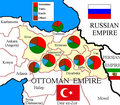Blue Book (Bryce and Toynbee book)
 | |
| Author | Arnold Joseph Toynbee |
|---|---|
| Original title | The Treatment of Armenians in the Ottoman Empire: Documents presented to Viscount Grey of Fallodon |
| Language | English |
| Subject | History |
| Publisher | Sir Joseph Causton and Sons Ltd. |
Publication date | 1916 |
| Publication place | England, UK |
| Media type | Print (Hardcover) |
| Pages | 742 |
| Text | The Treatment of Armenians in the Ottoman Empire online |
The Blue Book, officially titled The Treatment of Armenians in the Ottoman Empire 1915-1916, was an official report commissioned by the British Parliament and presented in 1916 by Viscount Bryce and Arnold J. Toynbee.[1] The 742-page volume is a compilation of over 100 sources that chronicled the early period of the Armenian genocide and the Assyrian genocide in the Ottoman Empire.[2][3]
Contents
Commissioned by the British Government and issued as an official Parliamentary "Blue Book" report in October 1916, the volume is divided regionally into twenty sections, each of which contains multiple eyewitness and secondhand reports, dispatches, news articles, and letters. In total there were 149 documents and 15 appendixes.[4] The publication presents Arnold J. Toynbee's analysis of the population in the Ottoman Empire. The presented table and map show the re-calculated values of the stated provinces using values where Armenians were the majority of the population, according to Toynbee's estimates. The book was subsequently published in 1916 by Hodder and Stoughton.
-
Ethnic values of Six vilayets according to presented data.
-
Ethnic map of Six vilayets according to presented data.
Reception
Although the book has been criticized by some Turkish denialists as propaganda to build up support for the war,[5] Bryce submitted the work to scholars for verification before its publication. Oxford professor Gilbert Murray stated of the tome, "...the evidence of these letters and reports will bear any scrutiny and overpower any skepticism. Their genuineness is established beyond question."[6] Other professors, including Herbert Fisher of Sheffield University and former American Bar Association president Moorfield Storey, affirmed the same conclusion.[7]
In 2005, the Turkish National Assembly demanded an apology for the publication of the book.[8]
See also
- The Blue Book, Political Truth or Historical Fact, a 2009 documentary film in support of the authenticity of the report
- Armenians in the Ottoman Empire
- Press coverage during the Armenian Genocide
References
- ^ Toynbee, Arnold; Bryce, James Bryce; Great Britain. Foreign Office (1916). The treatment of Armenians in the Ottoman Empire, 1915-16 : documents presented to Viscount Grey of Fallodon, Secretary of State for Foreign Affairs, by Viscount Bryce. Boston Public Library. London : H.M. Stationery Off., Printed by Sir Joseph Causton and Sons.
- ^ The Treatment of Armenians in the Ottoman Empire, 1915-1916: Documents Presented to Viscount Grey of Falloden by Viscount Bryce, James Bryce and Arnold Toynbee, Uncensored Edition. Ara Sarafian (ed.) Princeton, N.J.: Gomidas Institute, 2000. ISBN 0-9535191-5-5
- ^ Tusan, Michelle (2015). "James Bryce's Blue Book as Evidence". Journal of Levantine Studies. 5 (2): 33–50. Archived from the original on 2021-09-22. Retrieved 2022-08-13.
- ^ Michelle Tusan, "Crimes against Humanity": Human Rights, the British Empire, and the Origins of the Response to the Armenian Genocide, in American Historical Review, February 2014, page 57. [1]
- ^ "Arnold J. Toynbee ve James Bryce'nin Hazırladığı "Treatment of the Armenians in the Ottoman". Atatürk Araştırma Merkezi.
Arnold J. Toynbee 1915 Çanakkale ve 1921′de I. ve II. İnönü Savaşlarına savaş muhabiri olarak katılmıştır. İngiltere Dışişleri Bakanlığı adına da görev yapmıştır. PRO. W. O. 104 serisi incelendiği zaman bu görülecektir. Kendisi mutaassıp bir Hıristiyan olarak tanınır.
- ^ Dadrian. History of the Armenian Genocide, p. 228.
- ^ Dadrian. History of the Armenian Genocide, pp. 228–9.
- ^ Anderson, Margaret Lavinia (2015). "Genocide of Armenians: Through Swedish EyesThe Armenian Genocide: Evidence from the German Foreign Office Archives, 1915–1916". Holocaust and Genocide Studies. 29 (3): 483–488 [485]. doi:10.1093/hgs/dcv051.
Further reading
- Monger, David (2018). "Networking against Genocide during the First World War: the international network behind the British Parliamentary report on the Armenian Genocide". Journal of Transatlantic Studies. 16 (3): 295–316. doi:10.1080/14794012.2018.1482714.


